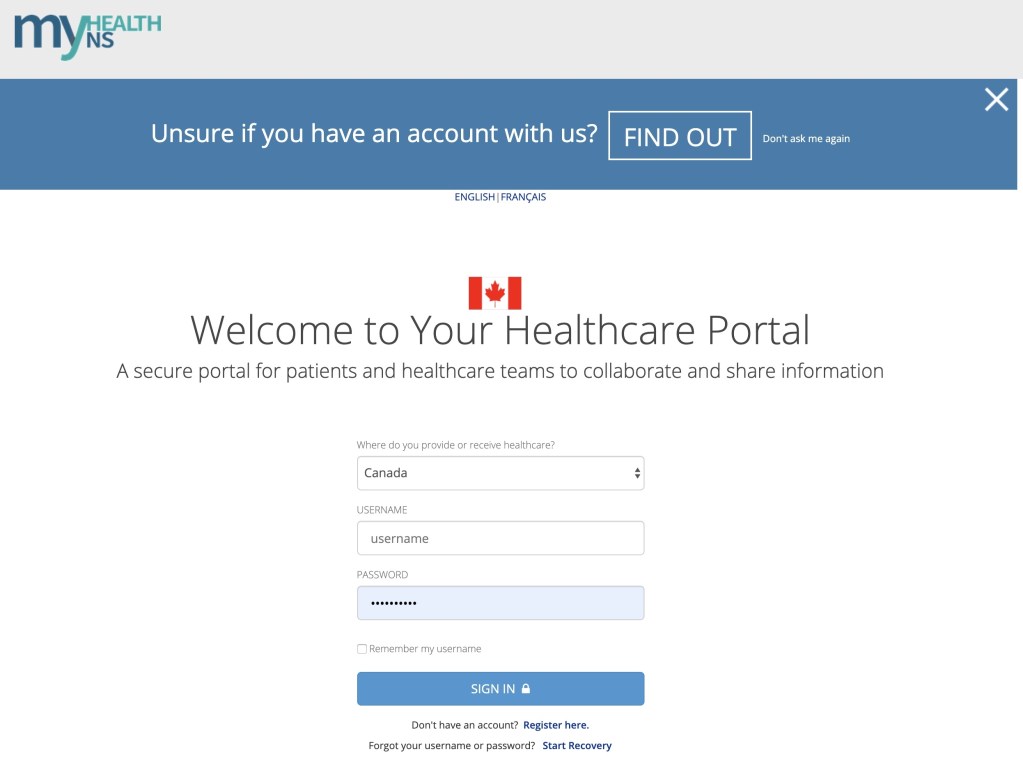We thought you’d never ask. We can’t tell you. But thanks for asking. Your health care matters to your government…

The provincial government’s news release last Wednesday was succinct, if not desert-dry. “MyHealthNS,” it began, “the province’s secure online service that allows patients to access their health information and securely communicate with their doctor, is moving to a new software vendor.”
Which new software vendor? When?
The release didn’t say.
Why? What happened?
Well, the release does say that McKesson Canada — which it does not mention is a wholly-owned subsidiary of McKesson, the Irving, Texas-based “world’s largest pharmaceutical wholesaler [more than $200-billion in revenues last year] and a pivotal player in other aspects of health care,” including providing “care management tools” like MyHealthNS — “is not renewing its contract with the province.”
Why not?
The release — all 223 words’ worth of it — doesn’t say.

Neither the province’s minister of health, Randy Delorey, nor McKesson spokesperson Andrew Forgione was much more forthcoming with journalists.
“The decision not to renew the contract was not taken lightly, as discussions took place over the last eight months to try and find a sustainable path forward for both McKesson Canada and the province,” Forgione told the CBC in a written statement.
Added Delorey: “Really, that’s a business decision within McKesson. I’m not going to speak on their behalf as to their rationale and decision-making process. Suffice to say they respected the terms and conditions of their contract and have provided the services that they were required to provide.”
We have come a long wrong way from November 20, 2012, when then-NDP Health Minister Dave Wilson declared himself “proud that Nova Scotia is leading the way with this new technology [to allow patients] to access their medical information, test results and book check-ups.” At the time, it was a pilot project known as RelayHealth.
McKesson boasted in the same release that it had been “delivering this solution for more than 13 years internationally, with more than 20 million patients and 36,000 physicians benefitting from the service. RelayHealth is a web-based technology that has been proven around the world.”
So what really did go wrong between that optimistic pilot project announcement and today’s no-deal?
The full $13.5-million project — 75 per cent of which was to be paid by Ottawa — was officially rolled out across the province in 2017 and touted as the country’s first province-wide service of its kind.
So far, however, just 300 doctors — less than 10 per cent of the total number of physicians in the province — have signed on to use the service. There may have been good reasons for that, including the fact the province failed for much of that time to come up with a system to compensate doctors for treating patients online instead of in person or on the phone. (The Examiner’s Jennifer Henderson offers an excellent backgrounder on this story and the larger issues here.)
Whatever the cause of the lack of sign-ups, the result is that the actual cost to date for the project has been just $8.5-million. But that has also meant McKesson — which is paid based largely on the basis of the number of physicians and patients who registered and used its online portal — has received significantly less in fees than it anticipated. Just $4.5 million to date. Chump change for a company with revenues north of $200-billion a year.
A good guess is that McKesson wanted a bigger slice of the pie, or perhaps a guaranteed annual fee in order to continue managing it. In his email to Canadian Press, Forgione did suggest there were various reasons for abandoning contract talks with the province, “including physician and patient uptake in the service.”
Which means?
Which means the province has now put a hold on enrolling any new doctors or patients in MyHealthNS until it finds a new company to operate the service. Under the terms of the contract between McKesson and the province, the company is obligated to keep the site running for six months. But no one will say when the clock begins — or did begin — ticking on that six months. Or what happens after that if no other company steps forward.
MyHealthNS seems like a good idea. One of the doctors in the original pilot project told CBC she had been able to improve her “patient capacity” by 22 per cent simply by dealing online with patients she didn’t have to see in her office.
My doctor has been part of it. I’ve been able to access test results, accompanied by a note from my doctor explaining what the results actually mean, luckily without requiring me to book an in-person follow-up with her. I had been hoping the service would expand to allow me to book appointments with my doctor online, which was one of its early promises.
That hasn’t happened, but Dr. Michelle Dow, the former president of Doctors Nova Scotia who was part of an advisory group set up to figure out ways to enhance the service, told the CBC she’d like to see that functionality too. “Let’s face it, you can book restaurant [reservations] and stuff like that with online bookings, so that’s a thing that could be integrated into the program.”
The collapse of contract negotiations with McKesson should prompt us to ask questions.
For starters, why we are making deals with multinationals like McKesson that inevitably hold us — and our information and information access — hostage whenever a contract comes up for renewal?
Given last year’s $120-million provincial surplus — and our ongoing healthcare crisis — shouldn’t we be investing in developing our own online system, one we could maintain and enhance ourselves moving forward?
Why is the government so unwilling to tell us what happened to MyHealthNS and what it means for us?
That’s one’s easy. And hard. Because that’s just the way this government governs.
This column first appeared in the Halifax Examiner August 12, 2019.




 STEPHEN KIMBER, a Professor of Journalism at the University of King's College in Halifax and co-founder of its MFA in Creative Nonfiction Program, is an award-winning writer, editor and broadcaster. He is the author of two novels and eight non-fiction books. Buy his books
STEPHEN KIMBER, a Professor of Journalism at the University of King's College in Halifax and co-founder of its MFA in Creative Nonfiction Program, is an award-winning writer, editor and broadcaster. He is the author of two novels and eight non-fiction books. Buy his books